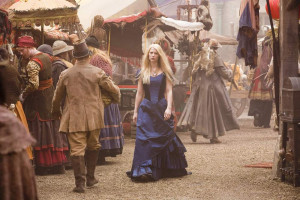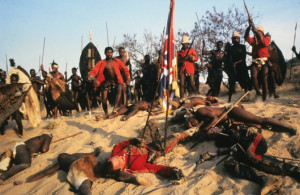
“THE KENNEDYS” (2011) Review
The past thirty to forty years have seen a great deal of movies, documentaries and television productions about one of the most famous political families in the U.S., the Kennedys. But none of them have garnered as much controversy or criticism as this latest production, an eight-part television miniseries that aired last April.
Directed by Jon Cassar, “THE KENNEDYS” chronicled the family’s lives and experiences through the 1960s – mainly during President John F. Kennedy’s Administration. The miniseries also touched upon some of the family’s experiences and relationships before JFK first occupied the White House through flashbacks in Episode One, which also focused upon Election Day 1960. And Episode Eight covered the years between JFK’s assassination and the death of his younger brother, Robert F. Kennedy in June 1968. But the meat of the miniseries centered on the years between January 1961 and November 1963. Unlike most productions about the Kennedys, which either covered JFK’s public experiences as President or the family’s private life; this miniseries covered both the public and private lives of the family.
Much to my surprise, “THE KENNEDYS” attracted a great deal of controversy before it aired. The miniseries had been scheduled to air on the History Channel for American audiences back in January of this year. However, the network changed its mind, claiming that “this dramatic interpretation is not a fit for the History brand.”. Many, including director Jon Cassar, believed that the network had received pressure from sources with connection to the Kennedy family not to air the miniseries. Several other networks also declined to air the miniseries, until executives from the Reelz Channel agreed to do so. That network failed aired “THE KENNEDYS” back in April and other countries, including Canada and Great Britain also finally aired it. After viewing the miniseries, I do not understand why the History Channel had banned it in the first place.
The miniseries not only attracted controversy, but also mixed reviews from the critics. Well, to be honest, I have only come across negative reviews. If there were any positive commentary, I have yet to read any. For me, “THE KENNEDYS” is not perfect. In fact, I do not believe it is the best Hollywood production on the subject I have seen. The miniseries did not reveal anything new about the Kennedys. In fact, it basically covered old ground regarding both JFK’s political dealings with situations that included the Bay of Pigs, the Civil Rights Movement and the Cuban Missile Crisis. It also covered many of thevery familiar topics of the Kennedys’ private lives – including the adulterous affairs of both JFK and Joseph Senior. Hell, even the miniseries’ take on the Cuban Missile Crisis seemed more like a rehash of the 2000 movie, “THIRTEEN DAYS”. In fact, the only aspect of this miniseries that struck me as new or original was the insinuation that First Lady Jacqueline Kennedy may have received amphetamine shots (also taken by JFK) from a Doctor Max Jacobson, to boost her energy for the numerous duties of her office. And I have strong doubts over whether this is actually true.
I have one other major complaint about the miniseries – namely the final episode. Episode Eight covered Jacqueline and Bobby’s lives during the remainder of the 1960s, following JFK’s death. For me, this was a major mistake. Although Part One mainly covered Election Day in November 1960, it also featured flashbacks of the family’s history between the late 1930s and 1960. But the majority of the miniseries covered JFK’s presidency. In my opinion, ”THE KENNEDYS” should have ended with JFK’s funeral, following his assassination in Dallas. I realize that the miniseries also featured the lives of Bobby, Jacqueline, Joseph Senior, Rose and Ethel’s live in heavy doses, it still centered on Jack Kennedy. By continuing into one last episode that covered Jacqueline and Bobby’s lives following the President’s death, it seemed to upset the miniseries’s structure. If that was the case, the setting for ”THE KENNEDYS” should have stretched a lot further than the 1960s.
But despite my complaints, I still enjoyed “THE KENNEDYS”. For one thing, it did not bore me. The pacing struck me as top notch. And it lacked the dry quality of the more well-received 1983 miniseries, “KENNEDY”. Although I believe that particular miniseries was superior to this new one, it sometimes felt more like a history lesson than a historical drama. It is possible that the additions of sequences featuring the family’s personal lives and scandals may have prevented me from falling asleep. But even the scenes that featured JFK’s presidency struck me as interesting – especially the scenes about the failed Bay of Pigs invasion in Episode Three. I also enjoyed the flashbacks that supported the miniseries’ look into Joseph Kennedy Senior’s control over his children and the shaky marriage between JFK and Jacqueline. At least two particular flashbacks focused upon JFK’s affair with Hollywood icon Marilyn Monroe, and its near effect upon younger brother Bobby. One scene that really impressed me was Bobby’s first meeting with the starlet. Thanks to Cassar’s direction, along with Barry Pepper (Bobby Kennedy) and Charlotte Sullivan’s (Marilyn Monroe), the scene reeked with a sexual tension that left viewers wondering if the pair ever really had a tryst. Both Greg Kinnear and Katie Holmes gave outstanding performances in two particular scenes that not only featured the explosive marriage between the President and First Lady, but also the depths of their feelings toward one another. The miniseries also scored with Rocco Matteo’s production designs. I was especially impressed by his re-creation of the White House, circa 1961. I was also impressed by Christopher Hargadon’s costume designs. He did a first-rate job in not only capturing the period’s fashions for both the male and female characters, but also in re-creating some of Jacqueline Kennedy’s more famous outfits.
Aside from the pacing, the miniseries’ biggest strength turned out to be the cast. I have already commented upon Charlotte Sullivan’s excellent performance as Marilyn Monroe. But she her performance was not the only supporting one that impressed me. Kristin Booth gave a top-notch portrayal of Bobby Kennedy’s wife, Ethel. And she did this without turning the late senator’s wife into a one-note caricature, unlike other actresses. I was also impressed by Don Allison’s turn as future President, Lyndon B. Johnson. However, there were moments when his performance seemed a bit theatrical. I also enjoyed how both John White and Gabriel Hogan portrayed the rivalry between a young JFK and Joseph Junior during the late 1930s and early 1940s, with a subtlety that I found effective. However, both Tom Wilkinson and Diana Hardcastle really impressed me as the heads of the Kennedy clan – Joseph Senior and Rose Kennedy. They were really superb. Truly. I was especially impressed by Wilkinson’s handling of his New England accent, after recalling his bad American accent in 2005’s “BATMAN BEGINS”. And I had no idea that Diana Hardcastle was his wife. Considering their strong screen chemistry, I wonder if it is possible for husband and wife to act in front of a camera together, more often.
The best performances, in my opinion, came from Greg Kinnear, Katie Holmes and Barry Pepper as JFK, Jacqueline Kennedy and Bobby Kennedy, respectively. For some reason, Pepper’s portrayal of Bobby seemed to keep the miniseries grounded. He did a great job in capturing the former senator and Attorney General’s ability to maintain solidarity in the family; and also his conflict between continuing his service to JFK and the family, and considering the idea of pursuing his own profession. For his performance, Pepper received a Best Actor in a Miniseries Emmy. Greg Kinnear’s take on JFK struck me as different from any I have ever seen in previous movies or television productions. Yes, he portrayed the style, charm, intelligence and wit of JFK. He was also effective in conveying the President’s conflict between his lustful desires for other women, his love for his wife and any “alleged” guilt over his infidelity. There seemed to be a slightly melancholy edge in Kinnear’s performance that I have never seen in other actors who have portrayed JFK. Perhaps that is why he managed to acquire an Emmy nomination. But I feel that the best performance came from Katie Holmes in her portrayal of First Lady Jacqueline Kennedy. Personally, I thought it was worthy of an award nomination. Unfortunately, she failed to acquire an Emmy nomination. Pity. I thought she did a superb job in capturing not only the style and glamour of the famous First Lady, but also the latter’s complex and intelligent nature.
I am well aware that most critics were not impressed by the miniseries. Hell, I am also aware that a good number of viewers have expressed some contempt toward it. I could follow the bandwagon and also express a negative opinion of “THE KENNEDYS”. But I cannot. It is not the best production I have ever seen about the famous political family. It did not really provide anything new about the Kennedy family and as far as I am concerned, it had one episode too many. But I was impressed by Jon Cassar’s direction, along with the outstanding cast and first-rate production and costume designs. And thinking about all of this, I still do not understand why the History Channel went through so much trouble to reject the miniseries’ airing on its network.
Filed under: Movie Review | Tagged: barry pepper, bay of pigs, cold war, cuban missile crisis, early 20th century, greg kinnear, history, katie holmes, mid 20th century, old hollywood, politics, television, tom wilkinson, vietnam war, world war 2 | Leave a comment »














